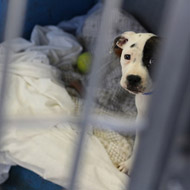
Battersea reports intake calls up 200 per cent
Battersea Dogs and Cats Home have reported a 204 per cent increase in the number of intake calls received during the first week of the school summer holidays compared with a normal week in May.
During the first week of the summer holidays, the charity say that their intake line received 328 calls, and 388 in the second week compared with just 108 in May - showing a surge as schools close down for the summer.
Battersea believes that there is a link between the rise in calls and people going on holiday and not having anyone to look after their dog or being able to afford boarding kennels.
One family brought their dog to the centre because they were going on holiday and had nobody to look after him. They told Battersea that they had sacrificed their holiday last year and didn't want to do so again.
“Every year around this time I anticipate a rise in the number of calls from people wanting Battersea to take in their pet, said Woody Woodford-Price, Battersea’s intake coordinator.
“It’s holiday season and people don’t always take pets into account when they’re booking to go away. So it’s rescue centres, like Battersea, who end up taking their pets in and finding new homes for them.
“We’ve had people confuse us with boarding kennels, asking if we can take their pet for a fortnight while they go away and others that blatantly bring in a ‘stray’ dog and send someone else to claim it back a week later.
“Dogs brought in under such false pretences are potentially taking the space that another genuinely needy dog might otherwise have occupied."
The charity are now urging prosepctive cat and dog owners to think carefully about the responsibily and commitment that owning a pet brings.
Image (C) Battersea Dogs and Cats Home



 The Animal and Plant Health Agency (APHA) has updated its online reporting service for dead wild birds.
The Animal and Plant Health Agency (APHA) has updated its online reporting service for dead wild birds.